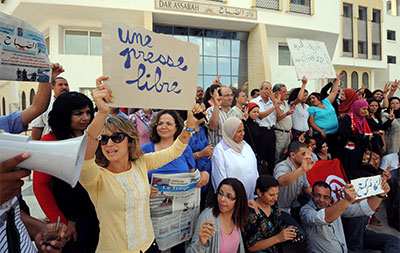These days, press freedom in Tunisia feels ever more distant.
Many journalists believed that media freedoms, which were virtually nonexistent under former President Zine el-Abidine Ben Ali, would grow after his ouster. During the aftermath of the December 2010 uprising, an independent press blossomed and special commissions were set up to reform the media sector. But since the elected government took office nine months ago, the tide has slowly reversed.
Over the past several months, the government appointed a series of new heads of media outlets, including state radio, print, and television establishments. The National Union of Tunisian Journalists denounced the government’s move as an attempt by the authorities to place their sympathizers in powerful positions in order to control state-run media coverage–a tactic also used by Egypt’s new government.
“The government is trying to exercise its control over the country’s media establishments,” said Kamel Labidi, former CPJ consultant, veteran journalist, and human rights defender. Labidi told me that the government appointed these individuals not based on any media experience or criteria, but because of their alignment with the ruling Ennahda party.
Labidi led the National Authority to Reform Information and Communication, a body tasked with reforming the media sector after the revolution. In July, Labidi and the rest of the commission resigned due to the government’s lack of commitment to press freedom. Among the reasons for his resignation were draft amendments proposed by a minor political party to the November 2011 Decree 115 of the new press code. The code, which is supposed to ensure freedom of press, has been approved by parliament but not yet implemented. The proposed amendments would introduce jail time for insulting saced icons and public figures, among other restrictions.
The most recent of the government appointments, in August, was that of Lotfi Touati, a former police commissioner and well-known government sympathizer, as head of the iconic Dar Assabah media group, the oldest media house in the country, established in 1951. Touati’s appointment stirred much controversy among Tunisian journalists. On September 11, Dar Assabah journalists and other employees went on strike to protest his appointment. In 2009, Touati was accused of leading a government-orchestrated takeover of the leadership of the National Union of Journalists, according to news reports.
Days after his appointment, Touati censored an article that was to be published in one of Dar Assabah’s dailies criticizing his appointment, according to news reports. He also fired one of the three top editors at the Arabic-language daily Assabah and published a limited list of people authorized to write editorials, the reports said.
More disturbingly, on September 13, a car driven by Touati struck Khalil Hannachi, a reporter for Assabah, according to news reports. Hannachi was outside the Dar Assabah headquarters in the capital, Tunis, waiting to confront Touati about recent decisions he had made regarding the media group and its newspapers, news reports said.
News accounts citing a witness reported that Touati started his car and “moved ahead at full speed.” The journalist lost consciousness and was taken to a local hospital, as shown in an amateur video circulating on YouTube after the incident. He sustained bruises on his head and has not regained full hearing, Assia Atrous, a reporter for Assabah, told me.
When I spoke to Atrous last week, she was attending a protest in front of the constituent assembly calling for an investigation of Touati. Atrous said the government has not taken any real steps to investigate the incident, although the Interior Ministry acknowledged it had received conflicting statements about the collision, according to news reports. Ministry spokesman Khaled Tarrouche said that Touati claimed the journalist “intentionally threw himself in front of the car,” while Hannachi “claimed he was deliberately hit.”
Naziha Ghodbeni, a journalist with Dar Assabah, told the news website Magharebia that the government was using the media group as “its mouthpiece to perpetuate its presence by shining its image and deceiving the public opinion about its false achievements.”
With these actions, journalists are reminded of the former regime’s repressive tactics, and that is not the direction Tunisia should be heading three months away from the second anniversary of the revolution.
UPDATE: This blog was modified to reflect the correct date of the Tunisian uprising.
